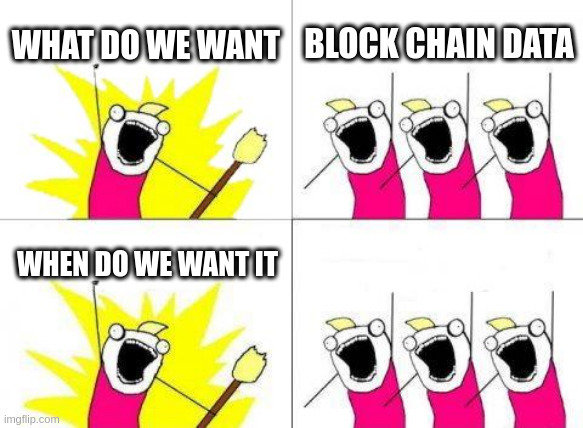Exploring P2P messages
(in Dogecoin)
By Lola
P2P Network
Full or SPV nodes communicate using a peer to peer network protocol via TCP.
They send each other messages to retrieve new blocks, transactions, peers, ...

It is not ... JSON RPC
The RPC API a user to talk to their node.
{
"jsonrpc": "1.0",
"id": "curltest",
"method": "getblock",
"params": ["00000000c937983704a73af28acdec37b049d214adbda81d7e2a3dd146f6ed09"]
}All the messages types
- version
- verack
- addr
- inv
- getdata
- notfound
- getblocks
- getheaders
- tx
- block
- headers
- getaddr
- mempool
- ping
- pong
- reject
- filterload
- filteradd
- filterclear
- merkleblock
- sendheaders
- feefilters
- ...
Message structure
| Field size | Description | Data type |
|---|---|---|
| 4 | magic bytes | Unsigned Integer (32 bits) |
| 12 | command | String (12 char) |
| 4 | length | Unsigned Integer (32 bits) |
| 4 | checksum (double sha 256) | Unsigned Integer (32 bits) |
| ? | payload | Bytes |
Example
C0C0C0C076657261636B000000000000000000005DF6E0E2
^ "verack" message
C0C0C0C0 <-- Dogecoin mainnet magic bytes
76657261636B000000000000 <-- "verack" command
00000000 <-- payload length
5DF6E0E2 <-- checksum of payload
Writting our custom Dogecoin node in python
What the node will do :
- Connect to another node
- Ask for blocks
- Deserialize blocks
Connect to a node

Connect to a node
import socket
import struct
import sys
import time
MSG_BLOCK_TYPE = 2
HOST = "51.158.74.86"
PORT = 18444
GENESIS_BLOCK_HASH = "3d2160a3b5dc4a9d62e7e66a295f70313ac808440ef7400d6c0772171ce973a5"
print("Attempt to connect to node")
s = socket.socket(socket.AF_INET, socket.SOCK_STREAM)
s.connect((HOST, PORT))
# Prepare Version Message
version_message = prepareVersionMessage(HOST, PORT)
payload = preparePayload(version_message, b'version')
# Send Version Message
s.send(payload)
# Received Version Message
wait_for(s, b'version')
payload = preparePayload(b'', b'verack')
s.send(payload)
wait_for(s, b'verack')
Version message
| Field size | Description | Data type |
|---|---|---|
| 4 | version | Integer (32 bits) |
| 8 | services | Unsigned Integer (64 bits) |
| 8 | timestamp | |
| 26 | remote node address | |
| 26 | local node address | |
| 8 | nonce | unsigned integer (64bits) |
| ? | user agent | String |
| 4 | start height | Integer (32 bits) |
| 1 | relay | bool |
Getting blocks

getblocks message
| Field size | Description | Data type |
|---|---|---|
| 4 | version | Unsigned Integer (32 bits) |
| 1+ | hash count | Compact Size |
| 32+ | hashes | Char[32] |
| 32 | stop hash | Char[32] |
inv/getdata message
| Field size | Description | Data type |
|---|---|---|
| 1+ | count | Compact Size |
| 36 x ? | inventory (hash+type) |
block message
| Field Size | Description | Data type |
|---|---|---|
| 4 | version | Integer (32 bit) |
| 32 | previous block | Char[32] |
| 32 | merkle root | Char[32] |
| 4 | timestamp | Unsigned Integer (32 bits) |
| 4 | bits | Unsigned Integer (32 bits) |
| 4 | nonce | Unsigned Integer (32 bits) |
| 1+ | transaction count | Compact Size |
| ? | transactions | Transaction |
blocks_count = 0
next_hash = GENESIS_BLOCK_HASH
print("Asking for a new batch")
get_blocks_message = prepareGetBlockMessage(next_hash)
payload = preparePayload(get_blocks_message, b'getblocks')
s.send(payload)
l = 0
while l <= 1:
# if 1 count it means it just tell us about a new block
inv_message = wait_for(s, b'inv')[24:]
l, offset = getCompactSize(inv_message[0:9])
print("l value is {}".format(l))
if l == 501:
# There are giving us an extra block (probably the latest block discover)
l = 500
for i in range(l):
(type, hash) = struct.unpack('I32s', inv_message[offset+(36*i):offset+(36*(i+1))])
# do we really need that ?
assert(type == MSG_BLOCK_TYPE)
if i == l-1:
next_hash = hash[::-1].hex()
# We can send the message now
payload = preparePayload(inv_message, b'getdata')
s.send(payload)
count = llog = ''
# Wait for 500 responses !
while count > 0:
# Received Inv Message
data = wait_for(s, b'block')
if data == 0:
print("ERROR : missing block")
sys.exit()
# verify data
magic, command, m_length, chcksm = struct.unpack('4s12sI4s', data[0:24])
if b'block' not in command:
print("ERROR : wrong command")
sys.exit()
if len(data[24:]) != m_length:
print("ERROR : Wrong length")
sys.exit()
block_message = data[24:]
count -= 1
hash = checksum(block_message[0:80])[::-1].hex()
print("Count : {} - Block hash {}".format(blocks_count + 500 - count, hash))
log += "----- {} -----\n".format(hash)
Getting all the blocks
Unpacking blocks
print("Count : {} - Block hash {}".format(blocks_count + 500 - count, hash))
log += "----- {} -----\n".format(hash)
txs = unpackBlock(block_message, False)
for tx in txs:
log += "{}\n".format(tx.hex())
print(log)The unpackBlock functions return all the transactions in the block.
What can you do next:
- Parse AuxPoW (auxiliary proof of work) block to go on testnet/mainnet
- Collect data from nodes
- Follow your dream

Find the transaction with the OP_RETURN code in its script.
Send the flag associated to it for a surprise.